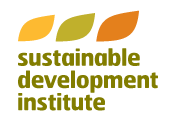
To document mining concessions about the protection of the environment and the rights of local communities in western Liberia, the Sustainable Development Institute (SDI) in late 2023 engaged mining communities in Grand Cape Mount and Bomi Counties on the Just Energy Transition (JET) project.
The JET is a thematic program within the Green Livelihoods Alliance (GLA 2.0) Forest for a Just Future. It connects local communities to global levels for struggles to address climate change by supporting a Just Energy Transition. It aims at addressing issues and approaches that are responsible for human rights violations, pollution, climate change, and deforestation in the current fossil energy framework, as well as prevent as many as possible similar injustices from being repeated within the Renewable Energy (RE) transition framework.
In Liberia, the SDI is promoting climate justice by collaborating with partners and allies to ensure an inclusive, Just Energy Transition in the country. The JET project is implemented in six of Liberia’s 15 counties. They include: Bomi, Gbarpolu, Grand Cape Mount, Grand Kru, Sinoe, and Maryland Counties respectively. As part of the implementation, the SDI from December 1-4, 2023 carried on a community engagement in Kinjor. In this gold mining community, Bea Mountain Mining Corporation (BMMC) operates in Grand Cape Mount County and Zelekai, a community in Bomi County where Western Clusters Liberia Limited is extracting iron ore.
Madam Angie Y. Fissibue, Lead Facilitator of the JET Project at the Sustainable Development Institute, said the overall goal of the engagements in the two counties was for women, youths, and other community members to understand the JET clearly. It was also intended to know the total number of large-scale mining concessions in the two counties and the types of minerals being manned by these concessions companies. Madam Fissibue further said the mapping was to document environmental, social, and economic impacts that are associated with the operations of these concessions and how these companies are working with the host communities in mitigating these issues.
Stakeholders considered during the engagement meetings included local leaders, women, youth leaders, and workers’ unions, among other citizens. They include Town, Clan, paramount chiefs, women and youth leaders, and commissioners, respectively.
Speaking to a cross-section of citizens during a town hall meeting, they lamented that despite the presence of these companies in their communities, they have yet to benefit from them amid environmental and other social harms associated with the operations of the companies.
“The school is not to standard and the women have to send their children to Monrovia for schooling. We want these companies to start providing livelihood activities for us, especially the youth and women. The operation of Bea Mountain Mining Corporation is affecting our communities and our resources are extracted daily from our land/forest,” the citizens said.
Kinjor and Larjor were combined during the relocation and now have an estimated population of over 17,000 due to the mining operations of BMMC. But the aggrieved citizens said “Yes, even the illicit mining we used to do, we're not doing it again, no farming, hunting, and other activities. We're suffering.”
“When the company came first, we Liberian citizens were working, but now the executives of the company have brought in their own people even for sweeping jobs, cleaning, and cooking. So, where we the citizens will do our livelihood activities? As a result, women are sleeping with men for money. The government doesn't have time for our people and Youth. We the youth and women are holding the government responsible for everything that is happening here.”
In Zelekai, a town directly affected as a result of Western Clusters’ operations, the citizens revealed that there has been no meeting between Western Cluster and the affected communities.
The citizens also alleged that they don’t have an MOU, but verbal promises were made to them, and they are yet to see the Mineral Development Agreement and yet to get a copy of the agreement.
Western Cluster Liberia, which is owned by Vedanta Resources PLC, an Indian multibillion-dollar corporation, has been under pressure of late to honor the terms of its 25-year contract for the mineral-rich Bomi Hills mines, which the company ignored, but resumed operation through a contentious MoU signed with the government in 2022. Western Cluster ceased mining operations in 2011, returning nearly 12 years later, claiming that certain supervening circumstances forced it to suspend operations that year after acquiring the full rights to the Bomi Hills mine from Elenilto in a deal worth close to US$100 million.
